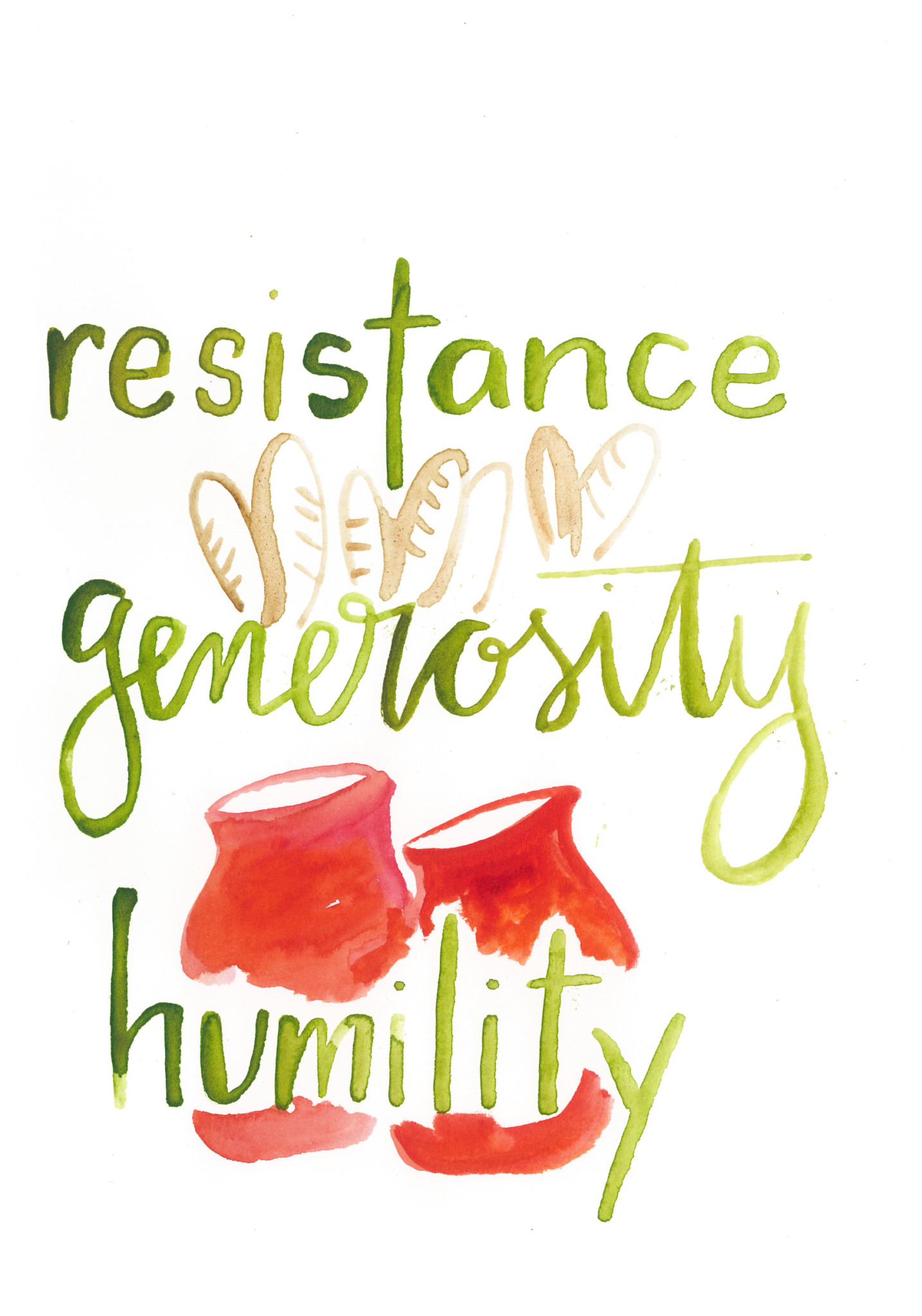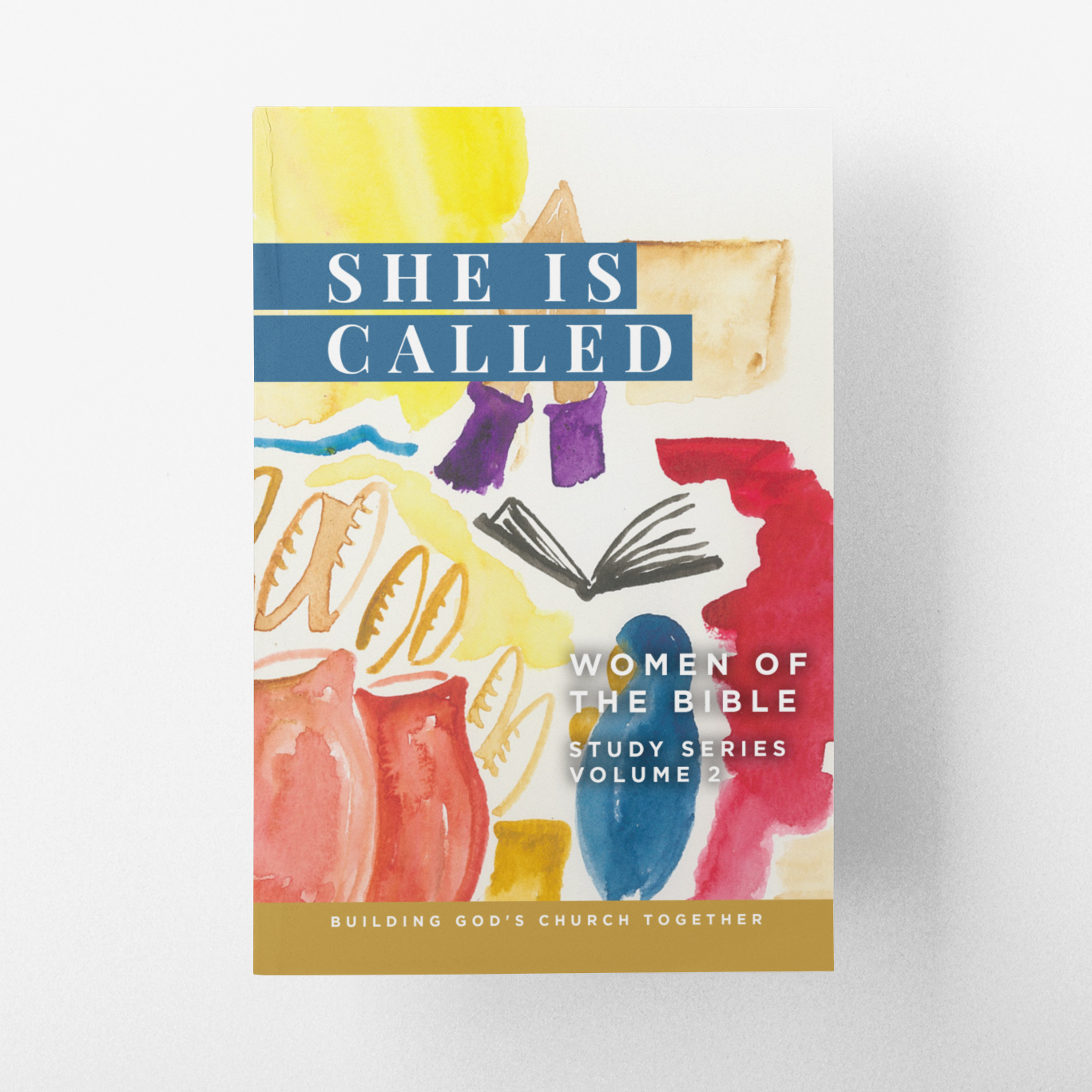In 1 Samuel 25, we find the story of Abigail in the Bible. When Abigail’s husband, Nabal, responded to David’s request for hospitality with suspicion, Abigail took action to save her family. Abigail’s courageous actions teach us the power of resistance, generosity, and humility to change the world.

She is Called Women of the Bible Study Vol. 2
Abigail
The Unseen Side of Injustice
By Rev. Dr. Denise Kingdom Grier
Prayer
God, Son, and Holy Ghost, we sit at your feet to drink from your never-ending fountain of wisdom and life. Pour out the fullness of yourself in order that we might delight in you all the more. Amen.
Key Scripture
“David said to Abigail, ‘Blessed be the LORD, the God of Israel, who sent you to meet me today! Blessed be your good sense, and blessed be you, who have kept me today from bloodguilt and from avenging myself by my own hand! For as surely as the LORD the God of Israel lives, who has restrained me from hurting you, unless you had hurried and come to meet me, truly by morning there would not have been left to Nabal so much as one male.’ Then David received from her hand what she had brought him; he said to her, ‘Go up to your house in peace; see, I have heeded your voice, and I have granted your petition.’” – 1 Samuel 25:32-35
Introduction to Abigail from the Bible
On one of the first sunny days of spring in Michigan, I pulled my chair to the sidewalk to take in the much needed vitamin D that was otherwise inaccessible from my front porch. There I sat, immobilized by the COVID-19 pandemic, the murders of Ahmaud Arbery and George Floyd, and the pain of systems of injustice that had entangled my oldest child. As I sat, I dwelled on 1 Samuel 25 and on the wealthy Nabal’s greatest asset—his wife, Abigail, who was both clever and beautiful.
Abigail in the Bible represents the unseen side of injustice, inequity, and unfair treatment. Despite her obstacles, Abigail plants seeds of generosity, humility, and faithful resistance—seeds that have what is useful to save not only her household but also the entire kingdom and even the soon-to-be-king of Israel from God’s judgment.
Abigail saves her husband, her son, her brother, and her nephews. She also saves David, who didn’t even know he needed to be saved. She does all of this without disparaging or discrediting her husband. At the untimely demise of Nabal not long after, she becomes one of the wives of David, the second king of Israel.
Digging Deeper: 1 Samuel 25
Nabal and David
David had just been anointed by the prophet Samuel to be king, but had not yet ascended to the throne. David, a shepherd by trade, was in the wilderness near Nabal and Abigail’s estate. Having learned that Nabal was having his sheep sheared, David inquired about the possibility of he and his men joining Nabal for the festivities. David’s men had protected Nabal’s shepherds when the two groups were adjacent to each other in the wilderness previously, and David hoped his kindness would be repaid by Nabal’s hospitality. Hospitality was the preeminent social and cultural value of the time, and David’s request would not have required much sacrifice for the wealthy Nabal.
But Nabal received the request with suspicion and bitterness. “Shall I take my bread and water and the meat that I have butchered for my shearers, and give it to men who come from I do not know where?” he inquired of David’s servants (1 Samuel 25:11).
The young men returned to David with the report of Nabal’s response, which infuriated David. David had but one resolve: to uproot Nabal’s entire family from the kingdom. “Every man strap on his sword!” (1 Samuel 25:13).
As I sat in front of a young tree on my porch, I wondered how deep its roots went. As I did so, I silently cheered for David, “Yes, David! Uproot the household of Nabal and its bitterness.” Sometimes, things have to be uprooted.
Enter Abigail.
Abigail and David
Abigail makes haste to gather up the bread of humility, the cup of generosity, and the bowl of resistance to meet David and his army. She loaded wine and bread, dates and fig cakes on her animals, determined to save her sons, brothers, and husband. She had to try to keep her family tree from being uprooted; after all, these weren’t just Nabal’s brothers and sons—they were hers, too.
Maybe the whole tree shouldn’t be uprooted. I repented.
With David in view, she dismounted her animal and poured herself on the ground with the extreme opposite response of her husband to the future king. Her resistance to the judgment of David was matched by her resistance to her husband’s disposition. Her resistance was seasoned with humility and served on the platter of generosity. Abigail uncovered for David parts of her household that had not been revealed by Nabal. Her household was not just a place of arrogance but also of humility and honesty. She acknowledged the transgression of her husband. She made known generosity that surpassed the stinginess of Nabal. She offered David gifts and begged for his forgiveness while simultaneously saving him from God’s wrath had he annihilated a whole people due to the surly nature of one.
Abigail saves.
“Blessed be the Lord, the God of Israel who sent you to meet me today” (1 Samuel 25:32). At once, David and I have a revelation at the same time, though in different centuries: you cannot uproot a tree you did not plant because you do not know what is in the soil. All you know is what you see.
She Is Called and We Are Called
COVID-19 has exacted a price. It has prevented us from traveling, from freely gathering, and from marking significant events in our lives. COVID-19 is surly, unforgiving, and indiscriminate. Who of us, if we had a sword to uproot it from our world, wouldn’t strap on our weapon and take our best shot? If only we could, then Easter would bring forth pageantry again, and summer would welcome reunions and vacations with family and friends. If only we could uproot it so that it could never come back, never claim the lives of our loved ones, never disrupt our livelihood again. A person would be well within her rights to destroy every single remnant of its existence off of the face of the planet.
Except for Abigail.
Abigail, the wife of Nabal, reminds us that in the midst of the most surly conditions there is still some good worth saving.
In the spring of 2020, while the world was glued to the television watching the numbers and statistics that would indicate when we would be able to go to the beach or travel abroad, we witnessed a disturbing sight. The murders of Ahmaud Arbery and George Floyd were front and center for the entire world to see, and the surly root in our country had been exposed. From places of isolation, the world raised one masked and muffled voice, a cry of resistance: resistance to this kind of brutality, to this kind of injustice, to this kind of tree. Our eyes saw what we would not have seen had it not been for COVID-19’s lockdown.
And churches responded, mostly with humility, acknowledging the value of Black lives and the need to change course. We responded with generosity, supporting Black-owned businesses, elevating the voices of Black people in our communities, and committing ourselves to pay attention, pray for peace, and work for equity.
We responded, like Abigail, making known that our world, our country, our communities are not all bad. Indeed, they are also breeding grounds for resistance, generosity, and humility—three ingredients that live on the underside of media coverage and partisan debate. Three ingredients that reflect the good news of the gospel. Three ingredients that only a pandemic could have recovered. COVID-19 might be surly, but the lockdown that accompanied it gave the church a voice and a means to make known that there is goodness in the world, which is why God sent his Son to save what didn’t even know it needed to be saved.
Conclusion
In the face of the surly and difficult things in this world, we might be tempted to uproot the whole tree and start anew. Abigail reminds us that underneath the tough stuff is often hiding the beauty of resistance, generosity, and humility. Abigail encourages us to dig deeper, to look beyond the surface, and to speak boldly in ways that redeem even places in our world that do not know they are in need of redemption.
From our front porches, our balconies, our highrise windows, let us look to the trees and be challenged to resist what destroys with the courage and grace of Abigail.
Discussion Questions
- Where have you discovered goodness hiding underneath struggle?
- Name a time when you were disarmed by someone’s unexpected generosity and humility.
- What surprised you in this Bible study session?
- What do you hear the Spirit saying to you/your family/your church/your community?
Rev. Dr. Denise Kingdom Grier is the Pastor of Mobilization and Renewal at Mars Hill Bible Church in Grandville, Michigan. She recently ended a 12-year tenure as lead pastor at Maple Avenue Ministries in Holland, Michigan. She is also RCA Global Mission’s coordinator for Setshabelo Family and Child Services in the Free State Province in South Africa. Rev. Grier graduated from Shaw University in Raleigh, North Carolina, where she received a BA in psychology. After functioning as a social worker for many years, she went on to become the first African American female to graduate from Western Theological Seminary in Holland, Michigan, with both the master of divinity and doctorate of ministry degrees. She is a longtime student of the Word who brings dynamic and prophetic insights to her preaching, teaching, and pastoral life. She lives in Holland, Michigan, with her daughter Gezelle, son Chris, and doggie-woggie Kgabani.
Continue this Bible study as a book
Get your copy of the She Is Called Women of the Bible Study Vol. 2

This Bible study is from the second book in the Women of the Bible Study Series. Get the book to discover how women like Mary and Martha, Abigail, and Junia embraced God’s call for their lives.